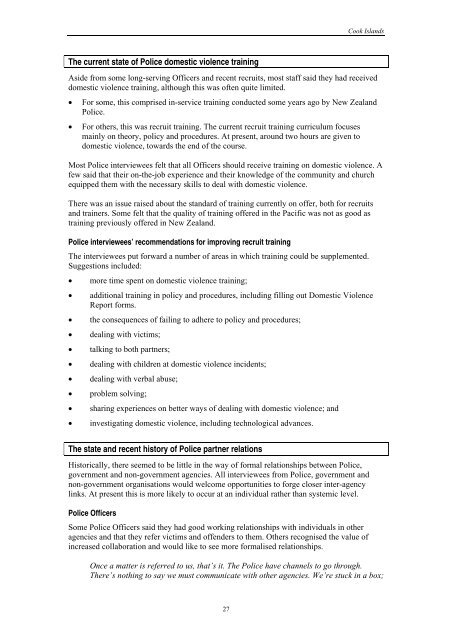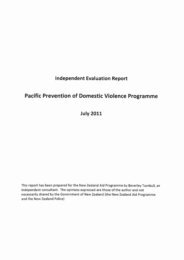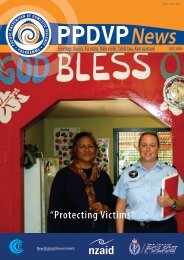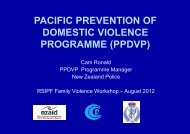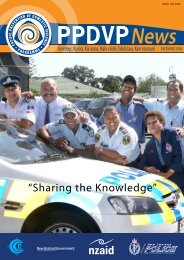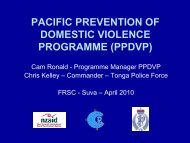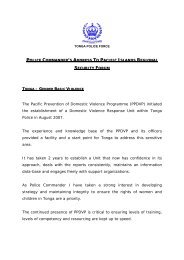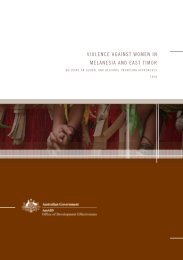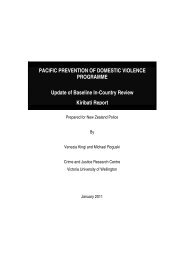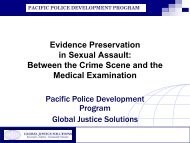Cook Islands - Pacific Prevention of Domestic Violence Programme
Cook Islands - Pacific Prevention of Domestic Violence Programme
Cook Islands - Pacific Prevention of Domestic Violence Programme
You also want an ePaper? Increase the reach of your titles
YUMPU automatically turns print PDFs into web optimized ePapers that Google loves.
<strong>Cook</strong> <strong>Islands</strong><br />
The current state <strong>of</strong> Police domestic violence training<br />
Aside from some long-serving Officers and recent recruits, most staff said they had received<br />
domestic violence training, although this was <strong>of</strong>ten quite limited.<br />
• For some, this comprised in-service training conducted some years ago by New Zealand<br />
Police.<br />
• For others, this was recruit training. The current recruit training curriculum focuses<br />
mainly on theory, policy and procedures. At present, around two hours are given to<br />
domestic violence, towards the end <strong>of</strong> the course.<br />
Most Police interviewees felt that all Officers should receive training on domestic violence. A<br />
few said that their on-the-job experience and their knowledge <strong>of</strong> the community and church<br />
equipped them with the necessary skills to deal with domestic violence.<br />
There was an issue raised about the standard <strong>of</strong> training currently on <strong>of</strong>fer, both for recruits<br />
and trainers. Some felt that the quality <strong>of</strong> training <strong>of</strong>fered in the <strong>Pacific</strong> was not as good as<br />
training previously <strong>of</strong>fered in New Zealand.<br />
Police interviewees’ recommendations for improving recruit training<br />
The interviewees put forward a number <strong>of</strong> areas in which training could be supplemented.<br />
Suggestions included:<br />
• more time spent on domestic violence training;<br />
• additional training in policy and procedures, including filling out <strong>Domestic</strong> <strong>Violence</strong><br />
Report forms.<br />
• the consequences <strong>of</strong> failing to adhere to policy and procedures;<br />
• dealing with victims;<br />
• talking to both partners;<br />
• dealing with children at domestic violence incidents;<br />
• dealing with verbal abuse;<br />
• problem solving;<br />
• sharing experiences on better ways <strong>of</strong> dealing with domestic violence; and<br />
• investigating domestic violence, including technological advances.<br />
The state and recent history <strong>of</strong> Police partner relations<br />
Historically, there seemed to be little in the way <strong>of</strong> formal relationships between Police,<br />
government and non-government agencies. All interviewees from Police, government and<br />
non-government organisations would welcome opportunities to forge closer inter-agency<br />
links. At present this is more likely to occur at an individual rather than systemic level.<br />
Police Officers<br />
Some Police Officers said they had good working relationships with individuals in other<br />
agencies and that they refer victims and <strong>of</strong>fenders to them. Others recognised the value <strong>of</strong><br />
increased collaboration and would like to see more formalised relationships.<br />
Once a matter is referred to us, that’s it. The Police have channels to go through.<br />
There’s nothing to say we must communicate with other agencies. We’re stuck in a box;<br />
27


